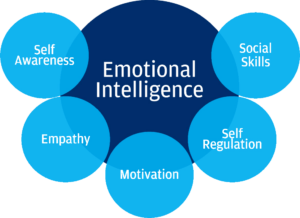Emotional Intelligence
Quantum leaders possess the ability to understand and manage relationships, including their emotional dimensions. This second level of thinking is our “emotional intelligence (EQ).“ Goleman (1995) established that emotional intelligence is self-awareness, self-regulation, motivation, empathy, and social skills for building networks. Emotional intelligence describes the ability, capacity, skill, or self-perceived ability to identify, assess, and manage the emotions of one’s self, of others, and groups (Serrat, 2017).
Emotional intelligence (EQ) is the ability to understand and manage one’s own emotions and influence others’ emotions. EQ can make the difference between a good leader and a great one and is a fundamental building block of Quantum Leadership. A leader with a high degree of EQ is aware of their actions and feelings, demonstrates empathy, communicates effectively, listens to wants and needs, is adaptable to change, and can invoke intrinsic motivation in others.

Goleman (1998) developed a framework of five elements that define emotional intelligence:
- Self-Awareness – People with high emotional intelligence are self-aware and understand their emotions. They are confident and trust their intuition but are also willing to take an honest look at themselves. They know their strengths, weaknesses, and Achilles’ heel, and they work on these areas to perform better.
- Self-Regulation – This is the ability to control emotions and impulses. People who self-regulate typically do not allow themselves to become too angry or jealous, and they do not make impulsive, careless decisions. They think before they act. Characteristics of self-regulation are thoughtfulness, comfort with change, integrity, and the ability to say no.
- Motivation – People with a high degree of emotional intelligence are intrinsically motivated. They are willing to defer immediate results for long-term success. They are highly productive, thrive in challenging situations, and are very effective in whatever they do.
- Empathy – Empathy is the ability to identify with and understand the wants, needs, and viewpoints of those around you. People with empathy are good at recognizing others’ feelings, even when those feelings may not be obvious. As a result, empathetic people are usually excellent at relationships, listening, and relating to others. They avoid biases, stereotyping, and judging too quickly, and they live their lives in a very open, honest way.
- Social Skills – The ability to comfortably interact with people with good social skills is another sign of high emotional intelligence. Those with strong social skills are typically team players. Rather than focus on their success first, they help others develop and shine. They can manage disputes, are excellent communicators, and are masters at building and maintaining relationships.
We may not all be naturally gifted with emotional intelligence. Fortunately, EQ can be learned.
Articles on Emotional Intelligence
https://www.verywellmind.com/utilizing-emotional-intelligence-in-the-workplace-4164713